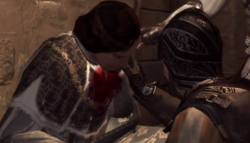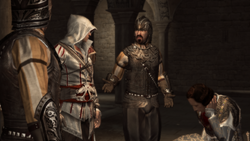m (AWB Edit) |
m (→Pazzi Conspiracy: Minor mistake) |
||
| Line 30: | Line 30: | ||
[[File:Poliziano Pazzi Conspiracy AC2.png|thumb|250px|Poliziano tending to a wounded Lorenzo.]] |
[[File:Poliziano Pazzi Conspiracy AC2.png|thumb|250px|Poliziano tending to a wounded Lorenzo.]] |
||
| − | Poliziano aided the Medici during the [[Pazzi Conspiracy]], a plot by the [[House of Pazzi|Pazzi family]] to murder Lorenzo and his brother and co-ruler [[Giuliano de' Medici|Giuliano]]. On April 26, 1478, Poliziano stayed at the [[Palazzo Medici]], where he tended to |
+ | Poliziano aided the Medici during the [[Pazzi Conspiracy]], a plot by the [[House of Pazzi|Pazzi family]] to murder Lorenzo and his brother and co-ruler [[Giuliano de' Medici|Giuliano]]. On April 26, 1478, Poliziano stayed at the [[Palazzo Medici]], where he tended to the wounded Lorenzo.<ref name="Assassin's Creed II"/> |
Lorenzo had been escorted there by [[Ezio Auditore da Firenze]], a young Florentine noble who had also lost family to the Pazzi. While Poliziano treated Lorenzo's wounds, Lorenzo sent Ezio to the [[Palazzo della Signoria]] to assassinate [[Francesco de' Pazzi]] and his supporters. Ezio made his way up the Palazzo, and eventually killed a fleeing Francesco on the rooftops, and was recognized as a hero by the city.<ref name="Assassin's Creed II"/> |
Lorenzo had been escorted there by [[Ezio Auditore da Firenze]], a young Florentine noble who had also lost family to the Pazzi. While Poliziano treated Lorenzo's wounds, Lorenzo sent Ezio to the [[Palazzo della Signoria]] to assassinate [[Francesco de' Pazzi]] and his supporters. Ezio made his way up the Palazzo, and eventually killed a fleeing Francesco on the rooftops, and was recognized as a hero by the city.<ref name="Assassin's Creed II"/> |
||
Revision as of 09:03, 2 July 2012
- "No! If they get inside, they'll murder all our supporters and put their own devils in power!"
- ―Poliziano, after hearing that the Pazzi had taken over the Palazzo della Signoria.
Angelo Ambrogini (1454–1494), commonly known by his nickname Poliziano, was an Italian Renaissance classical scholar and poet, and one of the revivers of Humanist Latin.
Biography
Early life
Poliziano was born in the small Italian town of Montepulciano in 1454. At age ten, his father, Benedetto, who was a jurist of distinguished ability, was killed for adopting the cause of the Medici family in the town.[1][2]
That same year, Poliziano moved to Florence and stayed there as a guest of one of his cousins. While in Florence, he learned Latin and Greek, as well as the rudiments of philosophy. Once he reached age thirteen, he began to circulate Latin letters, and three years later, at age sixteen, he wrote a letter to Lorenzo de' Medici in which he offered to translate the Iliad for Lorenzo's library.[1]
Poliziano was hired by Lorenzo as his household tutor for his children shortly afterwards, and became one of Lorenzo's most trustworthy supporters and loyalists. Lorenzo also secured Poliziano a distinguished post at the University of Florence, and Poliziano later became one of the scholars at the Platonic Academy.[1]
Teachings
It was the method of professors during the Renaissance to read the Greek and Latin authors with their class, and to dictate philological and critical notes. They also corrected corrupt passages in the received texts, making clear explanations of the matter, and teaching laws, manners, religious and philosophical opinions of the ancients.[2]
Poliziano covered nearly the whole ground of classical literature during his tenure, and published the notes of his courses upon Ovid, Suetonius, Statius, Pliny the Younger, and Quintilian. He also undertook a recension of the text of the Pandects of Justinian I, which formed the subject of one of his courses.[2]
Pazzi Conspiracy
- "Go! Before it's too late. Do what you can."
- ―Poliziano ordering Ezio to stop Francesco de' Pazzi.[src]

Poliziano tending to a wounded Lorenzo.
Poliziano aided the Medici during the Pazzi Conspiracy, a plot by the Pazzi family to murder Lorenzo and his brother and co-ruler Giuliano. On April 26, 1478, Poliziano stayed at the Palazzo Medici, where he tended to the wounded Lorenzo.[1]
Lorenzo had been escorted there by Ezio Auditore da Firenze, a young Florentine noble who had also lost family to the Pazzi. While Poliziano treated Lorenzo's wounds, Lorenzo sent Ezio to the Palazzo della Signoria to assassinate Francesco de' Pazzi and his supporters. Ezio made his way up the Palazzo, and eventually killed a fleeing Francesco on the rooftops, and was recognized as a hero by the city.[1]
Later life and death
Lorenzo died on April 9, 1492, but Poliziano outlived him, passing into the service of Lorenzo's son, Piero de' Medici. However, Poliziano himself died of arsenic poisoning on September 24, 1494, most likely from Piero himself.[1]
After Poliziano's death, Piero was exiled from the city by Girolamo Savonarola, the new self-declared ruler of Florence. Savonarola's arrival marked the end of Florence's prosperous era, and the beginning of the Bonfire of the Vanities.[1]
Personality and Characteristics

Poliziano (middle right) with Ezio and Lorenzo.
Poliziano was a cautious and vigilant servant of Lorenzo, not allowing Ezio to vouch for Lorenzo's injuries during the Pazzi Conspiracy, prompting Lorenzo himself to demand that Poliziano open the door. Upon letting the two in, he became protective of Lorenzo, and was constantly making sure he was safe and received proper medical treatment for his severe injuries.[1]
Poliziano was also supportive of Lorenzo throughout the latter's rule, fighting to keep his master in power. He commanded Ezio to do what he could, ordering that he go to the Palazzo della Signoria to stop the Pazzi's takeover of the city.[1]
In terms of appearance, Poliziano wore the traditional Medici guard uniform with dark armor, and an olive colored tunic underneath. He had dark brown hair to match his dark square beard, and had easily visible wrinkles on his face. He was also of above average height, and average weight.[1]
References
